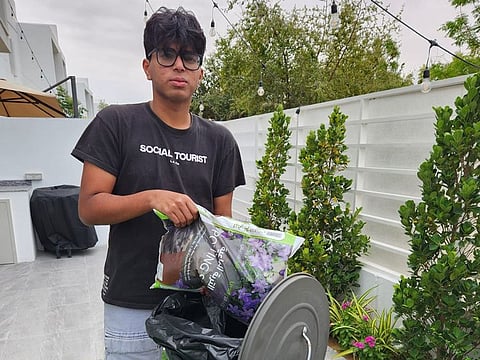Dubai teen turns kitchen waste into useful compost
16-year-old Madhav Agarwal turns kitchen waste into valuable compost

Do you know that food waste makes up a big part of our garbage? In fact, it's estimated that households throw away about 30 per cent to 40 per cent of the food supply every year! That's a lot of wasted resources and money. But there's a way to cut down on food waste and help the environment at the same time. It's called kitchen waste management, which is all about reducing, reusing, and recycling food waste.
Sixteen-year-old Madhav Agrawal, a student of IB-1 has found a creative way to tackle the issue of waste management. He has successfully turned kitchen waste into valuable compost, making a significant contribution to the environment. With the help of his family and neighbors, he has converted kitchen waste into compost, and it has become a successful project.
It all started two years back. Madhav lives with his parents, brother and grandmother. They have regular guest at home and the family prefers home-cooked food for the guest rather than ordering the food from outside. This would lead to lots of kitchen waste, which would accumulate and take considerable effort in cleaning and disposing. Madhav thought of trying to find ways to help his parents in disposing the kitchen waste. He did online research for ways to dispose kitchen waste in an environment friendly, cheap and easy method.
That’s when he found that cooked leftovers and waste from food preparation can be easily converted to compost, which is a very useful, rich, natural and off course virtually free of cost.
He tells us that initially, it was difficult to convince his parents about the idea. They were worried about the need for space and containers. Also, the concerns were about the smell from the waste and risks of insects, pests and the diseases that can come up in the process. His mother told him a single complaint from neighbours about these problems and she will stop the project further. To convince them, he started with small waste initially, which was to show that is clean, safe and that there is no smell at all.
The first step was to start with waste segregation - separating the kitchen waste from regular garbage. It is the key step, which requires maximum motivation as everybody has the habit of dumping all waste into a single bin. However, with some patience and encouragement, we soon started to separate our food scraps like fruit and vegetable peels, coffee grounds, and eggshells, and store them in a compost bin. Over time, we added yard waste like leaves and grass clippings to the bin, and the composting process began.
It took a few months for the compost to break down fully, but the result was worth the wait. We had rich, nutrient-dense compost that was perfect for our garden. We were able to grow healthy vegetables without using chemical fertilizers, and it was a satisfying feeling to know that we were making a positive impact on the environment.
After seeing the benefits of composting first-hand, he planned to do a pilot study with his family friends. He discussed with them about the whole process and how it could reduce waste and help them grow healthy plants. Some were hesitant at first, but after showing them how easy it was, many of them agreed. He distributed initial compost bins and took feed-back in forms of questionnaire regarding the problems faced and suggestions.
He now plans to start a club in his school. He plans to conduct lectures & demos in front of students about the concept. The club will provide handouts and bins to students who want to start the project at home. They also plan to give home visits to help parents understand the importance of the project and easiness with which it can be done.
He is also planning to set up a composting system in the school garden, where students can bring their food scraps to create compost. He also plans a composting bin for the school cafeteria. The resulting compost can be used in the school garden, and the students will learn about the benefits of reducing waste. This will help reduce the amount of waste that goes to the landfill and provide a valuable resource for our plants.
When asked about his experience, John says, "I feel great knowing that I am making a positive impact on the environment. Composting is easy, and it is an effective way to reduce waste and create a valuable resource for gardening."
One of the participating families, Dr Lisa says, “Initially we were hesitant, to keep the bin at home, worried about the smell and the pests it would attract. Surprisingly, there was neither. The compost was then used for the plants.The process was easy and we are continuing to implement it”.
Madhav's efforts have not gone unnoticed. His friends have recognized him for his contribution to the environment and hopes that more people will follow his example.
Composting is a simple but powerful way to reduce waste and create a valuable resource for gardening. Thanks to Madhav's initiative, many families and students in his community are now composting and making a positive impact on the environment.



